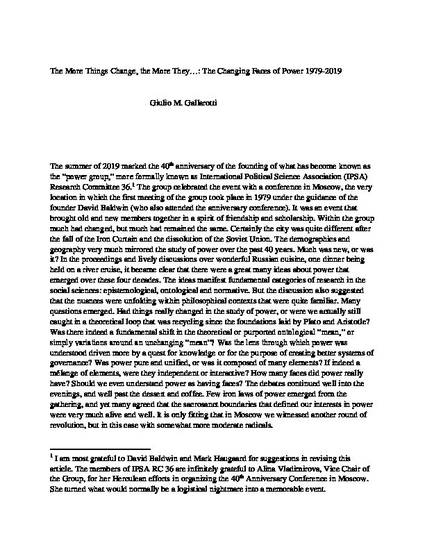
Other
The More Things Change, the More They…: The Changing Faces of Power 1979-2019
(2021)
Abstract
The summer of 2019 marked the 40th anniversary of the founding of what has become known as the ‘power group,’ more formally known as International Political Science Association (IPSA) Research Committee 36. The group celebrated the event with a conference in Moscow, the very location in which the first meeting of the group took place in 1979 under the guidance of the founder David Baldwin (who also attended the anniversary conference). It was an event that brought old and new members together in a spirit of friendship and scholarship. Within the group much had changed, but much had remained the same. Certainly the city was quite different after the fall of the Iron Curtain and the dissolution of the Soviet Union. The demographics and geography very much mirrored the study of power over the past 40 years. Much was new, or was it? In the proceedings and lively discussions over wonderful Russian cuisine, one dinner being held on a river cruise, it became clear that there were a great many ideas about power that emerged over these four decades. The ideas manifest fundamental categories of research in the social sciences: epistemological, ontological and normative. But the discussion also suggested that the nuances were unfolding within philosophical contexts that were quite familiar. Many questions emerged. Had things really changed in the study of power, or were we actually still caught in a theoretical loop that was recycling since the foundations laid by Plato and Aristotle? Was there indeed a fundamental shift in the theoretical or purported ontological ‘mean,’ or simply variations around an unchanging ‘mean’? Was the lens through which power was understood driven more by a quest for knowledge or for the purpose of creating better systems of governance? Was power pure and unified, or was it composed of many elements? If indeed a mélange of elements, were they independent or interactive? How many faces did power really have? Should we even understand power as having faces? The debates continued well into the evenings, and well past the dessert and coffee. Few iron laws of power emerged from the gathering, and yet many agreed that the sacrosanct boundaries that defined our interests in power were very much alive and well. It is only fitting that in Moscow we witnessed another round of revolution, but in this case with somewhat more moderate radicals.
Most of these papers were delivered at the conference, with some added later. They represent a broad swatch of thinking about power over the last 40 years, by some of the leading scholars on the subject of political power from differing disciplines in the social sciences. Indeed, we are all grateful to the distinguished contributors of this special issue for sharing with us stimulating ideas about one of the most important subjects in the social sciences. And in their words, we are comforted both by exciting new possibilities, but also by time-honored modes of understanding power.
Keywords
- power,
- political power,
- faces of power
Disciplines
Publication Date
Winter 2021
DOI
10.1080/2158379X.2021.1876990
Comments
This is an Editorial: Editor's Introduction to the Special Issue on The Changing Faces of Power, 1979-2019
Citation Information
The Changing Faces of Power, 1979-2019, Journal of Poltical Power 14,1
